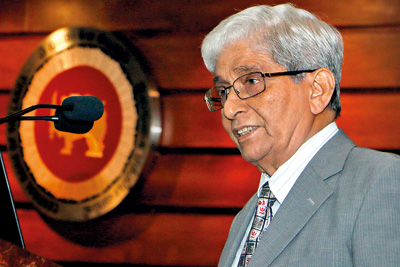End of a decade
As Sri Lanka witnesses the end of a decade (2009-2019), moving forward to the next decade (2020-2030) will ensue a period of significant change and as one analyst put it, an era where the top 20 companies in the Colombo bourse are unlikely to grow in a marketable sense and would be replaced by a growing number of start-ups – if they don’t embrace rapid changes in technology.

Newly-appointed Central Bank Governor Prof. W.D. Lakshman addressed his first media conference on Friday. Pic by Priyanka Samaraweera.
The era that is over is a reflection of a period in which flash floods, and extreme heat temperatures dominated while climate change became a buzzword but on the positive side, the conflict ended in 2009. On the dismal side however, the economy, after a few years of good growth, didn’t take off while the expected foreign investment didn’t happen as planned. The trade deficit grew with export earning struggling to keep pace with import costs.
On the peace and security side, many questions linger, particularly after the armed forces have been on alert after the devastating Easter Sunday bombings in April 2019.
Peace activist Jehan Perera said that the celebration of Christmas without incident and in the manner that Christians in Sri Lanka have traditionally done was a success of governance and security, and tight security keep people safe. “However, I have concerns about several matters that could potentially impact negatively upon inter-community relations with the state. The first is the president’s statements that development would be prioritised in resolving the ethnic conflict and that strengthening the system of devolution of power is not going to be the answer. Second is the president’s assertion that there is no problem of missing persons to be resolved and limiting it to those who fell on the battlefields of war. The third is the assertion by government leaders that the national anthem will not be sung in Tamil at the forthcoming Independence Day celebrations. For peace and security to be enhanced in the coming decade, we need to find solutions that do not exclude what each community prioritises,” he argued while adding that for instance, development requires that it meets the needs of people of each part of the country, which is better served through participation of those people in the decisions made, which is devolution.
Ajit Gunewardene, Founder and CEO of Bluestone Capital Pvt Ltd and a former Deputy Chairman at John Keells, reckons technology will play a key role in how the corporate sector progresses.
“The old school method of company valuation and of allocating funds is defunct. Private equity investment that can support losses while building scale will dominate. Private equity will be a dominant asset class in the coming decade. The public markets will be accessed only for price discovery and liquidity. In 10 years the top 20 market cap companies listed on the Colombo Stock Exchange will be companies that don’t exist or are considered start-ups today. If this does not happen it means this country has stagnated and in fact is disconnected with global markets,” he said.
“There is no choice but to embrace technology. We live in a hyperconnected world. The source of business dominance is inexorably linked to this new reality. The ubiquitous connectivity makes for a new power. It is open, participatory and peer driven. Understanding and leveraging this will be the model to succeed,” he added.
For economist Prof. Sirimal Abeyratne, the new decade provides Sri Lanka with opportunities and challenges.
“Growth has to be accelerated and macroeconomic issues – particularly budget deficit and trade deficit, has to be dealt with. If sluggish growth would not bounce back both budget deficit and trade deficit are likely to worsen with a further increase in debt burden. Can Sri Lanka provide a better policy and business environment which would win the investor confidence?” he asked
On the eve of a new decade, the Colombo capital market is yearning for new developments to forge ahead in the next 10 years.
In the next decade the capital market should play a role in enhancing Sri Lanka’s economic developmental goals, top officials said. “In the coming years the capital market should be developed to complement the banking sector in order to propel economic development,” Vajira Wijegunawardane, Director General, Securities and Exchange Commission (SEC) said. He said that the capital market should focus on creating an enabling environment to be the preferred mode of long-term fundraising for companies which in turn will help the development in the country. Ray Abeywardena, Chairman, Colombo Stock Exchange (CSE) noted that the exchange will be going ahead with new tech developments. “On the tech side we will be implementing delivery versus payment (DVP) system and getting the SEC Act passed. DVP gives more confidence to investors.”
Samantha Ranatunga, former chairman of the Ceylon Chamber of Commerce, noted that for companies to survive the next decade, they need to be thinking technology not as a function but how it will transform the business model and apply to every business.
“More social, national oriented business leaders are needed to support initiatives in addressing skill gaps, education,” he said.
Modernisation of the tea industry is a priority. Technology has to be introduced to the industry to add value in processing. Smart technology has a big role to play in tea production, he said, adding: “Aggressive destination marketing of Sri Lanka is necessary in tourism with a total focus on marketing on the web. The environmental angle in tourism needs much greater emphasis. This is to address the high spending tourist who is nature conscious.”


